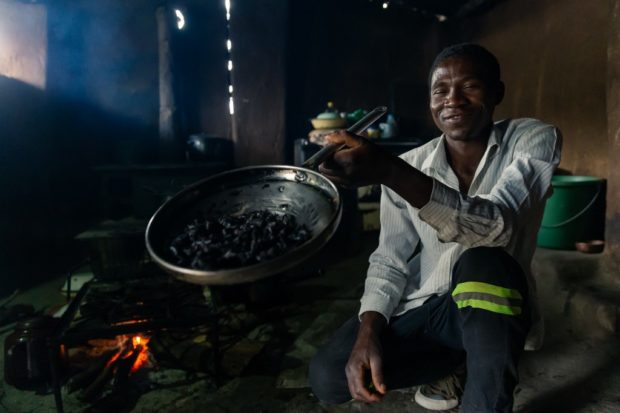
Earnmore Chikavaza shows off his pan with fried chafer beetles which were fried after first boiling in a pot after a succesful harvest in Mhondoro, Zimbabwe, on December 16, 2020. – In Zimbabwean towns, food tastes have become westernised, but in the countryside, there remains a time-honoured tradition of eating insects, mopani worms and white ants — the bounty of rich soil and luxuriant vegetation. (Photo by Jekesai NJIKIZANA / AFP)
MHONDORO, ZIMBABWE — Earnmore Chikavaza takes a mouthful of fried beetles and munches happily, downing the crunchy snack with a mouthful of water.
He runs out of superlatives to sum up the benefits of a food that is healthy, tasty, organic, and—a special advantage in a poor country—absolutely free.
The delicacy is the chafer beetle, also called the Christmas beetle, a dark-red Zimbabwean bug that proliferates in the southern hemisphere country at this time of year.
“You don’t spend anything on the beetles. They are free relish,” the slender 28-year-old miner told Agence France-Presse (AFP).
“All you have to do is to go out in the bush and shake them off or pluck them from musasa trees and they come in summer when other forms of relish are scarce,” he said.
In Zimbabwean towns, food tastes have become Westernized, but in the countryside, there remains a time-honored tradition of eating insects, mopani worms and white ants—the bounty of rich soil and luxuriant vegetation.
Chikavaza lives in Mhondoro, a village about 100 kilometers southwest of the capital Harare.
Three weeks of heavy rain have made it too dangerous to venture into the mining tunnels, so he spends time with a bowl in his hands, shaking beetles out of the trees for food.
Chikavaza takes his harvest to a local lady, Winnie Chikaonda, 72, who helps him cook the insects.
The recipe is simple—the beetles are boiled until soft and then fried until they reach the desired level of crunchiness.
“As children, we used to go out in the bush to harvest them,” Chikaonda recalled.
“God created them knowing they were healthy to eat. It’s a pity children from the cities don’t like them. They regard them as creepy creatures that bite.” — AFP